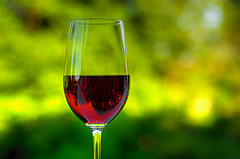
 Most likely, you’ve heard about the health benefits of red wine. According to the Mayo Clinic, studies suggest that the antioxidants in red wine may help prevent heart disease-by protecting the lining of blood vessels in the heart, deterring fat buildup and clogs. Resveratrol, in particular-an antioxidant found in red wine, red grapes, grape-seed extract, blueberries, cranberries, and dark chocolate-may help reduce bad cholesterol and prevent blood clots, perhaps even reduce inflammation. Apparently, however, the benefits of resveratrol don’t stop there-other studies have shown a potential cancer-fighting capability.
Most likely, you’ve heard about the health benefits of red wine. According to the Mayo Clinic, studies suggest that the antioxidants in red wine may help prevent heart disease-by protecting the lining of blood vessels in the heart, deterring fat buildup and clogs. Resveratrol, in particular-an antioxidant found in red wine, red grapes, grape-seed extract, blueberries, cranberries, and dark chocolate-may help reduce bad cholesterol and prevent blood clots, perhaps even reduce inflammation. Apparently, however, the benefits of resveratrol don’t stop there-other studies have shown a potential cancer-fighting capability.
Most of the studies so far have taken place in the lab, so scientists still aren’t sure of the applications in humans. However, the preliminary research looks promising. In test-tube studies, resveratrol causes cancer cells to destroy themselves by inhibiting the activity of a protein that nourishes them. A University of Nebraska study found that resveratrol protected estrogen, keeping it from changing in a way that would trigger tumors. A Chinese study showed that resveratrol also inhibited the invasion and migration of breast-cancer cells-important because such spreading is often the reason for death from breast cancer.
In 2007, Science News reported that University of Alabama researchers fed mice resveratrol-and those mice showed an 87 percent reduction in their risk of developing prostate tumors. A study in Barcelona, Spain showed that resveratrol promoted the death of colon-cancer cells. The Kaiser California Men’s study found that men who drank red wine had a lower risk of lung cancer. And that’s just a small sampling of the results.
What if you want to add resveratrol to your daily diet? Must you drink red wine? Those who enjoy the beverage will have no problem following this prescription, but be careful-all red wines are not the same, particularly in their resveratrol content. There’s more resveratrol in red wine than in white wine in general, because red wine grapes are fermented with the skins intact, allowing the wine to absorb more of the health nutrients, while white wine grapes are fermented without the skins.
What if you’re not a wine drinker? Since resveratrol is found in the skin of grapes, including more grapes and grape-related foods like juices and jellies in your diet can increase your resveratrol intake. In fact, some research has shown stronger benefits using grape skin rather than isolating resveratrol. For instance, investigators from the National Cancer Institute (NCI) found that a certain type of grape-skin extract that does not contain significant amounts of resveratrol still helped prevent prostate cancer growth.
What about supplements? Since resveratrol degrades once exposed to the atmosphere, just how much you would get from supplements is questionable. More importantly, studies have shown that resveratrol is better absorbed through the mucus membranes in the mouth. If you take it in pill form, it is metabolized by the intestines where its potency and beneficial properties are reduced. Food is better-go for more grapes, blueberries, cranberries, mulberries, and dark chocolate. If you want to try supplements, ask your doctor, then look for high-quality brands.
Have you increased your intake of resveratrol? Please share your story.
Photo courtesy rogersmj via Flickr.com.

